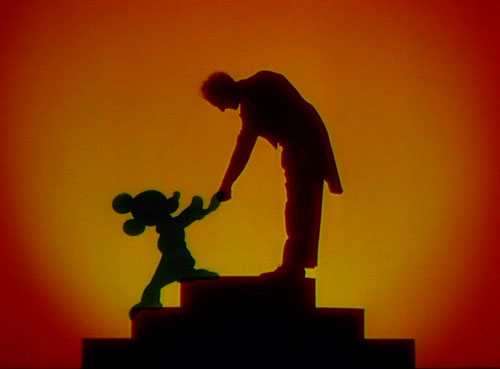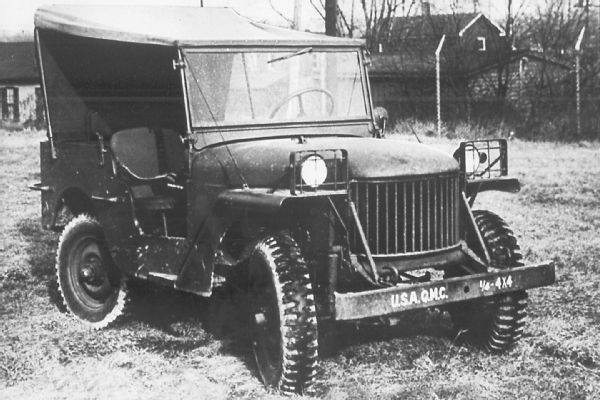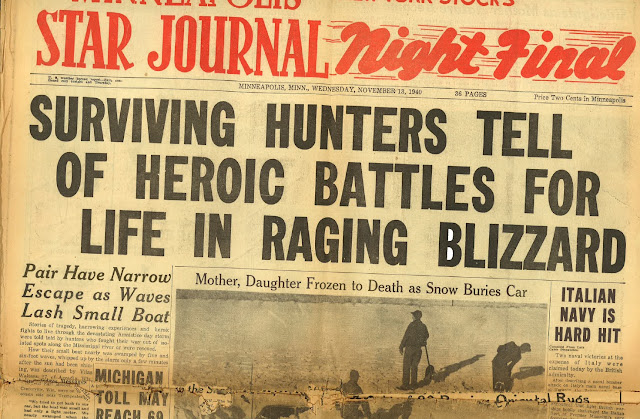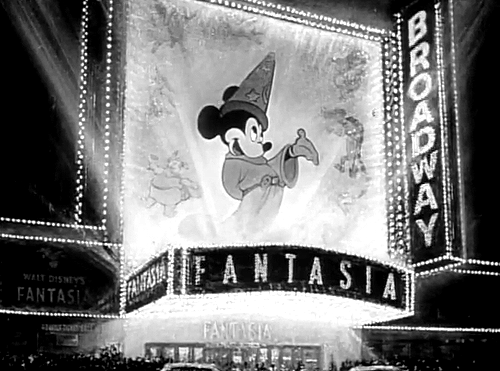Wednesday 13 November 1940
 |
| "Fantasia" premieres in New York City. |
Molotov stresses that the USSR has certain non-negotiable demands prior to any military alliance. The largest of these concern Finland. That country, Molotov emphasizes, lies within the USSR's sphere of influence pursuant to the August 1939 Ribbentrop-Molotov pact. The Stavka is aware of German troop movements in the country - primarily related to transit from Finnish Baltic ports to Narvik - and wants those troops withdrawn.
Another hot spot is in Romania. The Soviet Union already has swallowed part of Romania, and Molotov points out that Hitler has recently guaranteed the reduced Romanian frontiers. This seems aimed at the Soviet Union, which Molotov indicates is not a friendly act.
Molotov also raises other, less critical issues. He indicates that the Soviet Union intends to enter into some kind of arrangement with Bulgaria - the country that Hitler wants to use as a springboard to invade Greece (though Molotov likely has no idea of this). Molotov also indicates that the Soviet Union will be blocking off the Black Sea with bases on the Dardanelles - which raises issues about Turkey and the Balkan states' outlet to the Mediterranean.
Hitler has difficulty responding to some of these points. Regarding German activities in Finland, he responds that German activities there are of no matter and certainly of no concern to the Soviet Union. In fact, Hitler's position throughout the war is that the Soviet Union must be prevented from acquiring Finnish ports in the Baltic. The bases on the Dardanelles and the issue of the Soviet Union's relationship with Bulgaria are not something he can agree to without consulting his allies.
If there is anything that seals the fate of the Third Reich, it is this discussion. Hitler sees that, rather than cooperating in the destruction of the British Empire, the Soviet Union is pushing back against Germany. A military alliance drifts out of the range of feasibility, and the only remaining question becomes how confrontational relations will be.
After this meeting, German Foreign Minister Ribbentrop has dinner at the Soviet embassy. An air raid during the dinner forces them to take shelter under the Wilhelmstrasse. Ribbentrop decides to give the negotiation - going very badly - a final shot.
Ribbentrop proposes a treaty, including - as with their August 1939 agreement - secret protocols. The USSR would join the Three-Power Pact and acquire a specific sphere of influence, along with Italy, Japan and Germany. The secret protocols would outline what these spheres were and would recognize the Soviet Navy's rights in the Dardanelles.
Molotov is fairly noncommittal in response to Ribbentrop's offers about spheres of influence and the Dardanelles. However, he gets very specific about what the Soviet Union wants in Europe. The Soviet Union, he says, has interests in Romania, Hungary, Yugoslavia, Finland, Bulgaria, Poland and Greece. It also needs a way to ensure Swedish neutrality or at least acquiescence to Soviet passage through the Kattegat and Skagerrak to the Atlantic.
None of Molotov's demands are even remotely acceptable to the Germans.
This meeting between Molotov and Ribbentrop gives rise to an enduring legend. The discussion is held in a shelter (with liveried waiters bringing hors d'oeuvre on trays) to the sound of RAF bombs dropping fairly close by (they rattle the plate glass windows at the Wilhelmstrasse before the guests adjourn to the shelter). Supposedly, Molotov responds to one of Ribbentrop's repeated claims that Britain is finished and the war basically over with a tart observation:
If that is so, why are we in this shelter and whose are these bombs which fall?This is considered by virtually everyone to be apocryphal. It has that "wise guy" insouciance that smacks of a British propaganda invention, though that is unproven (it may also be an example of sardonic Germanic wit). In fact, however, the British do play an intentional role in this discussion: Winston Churchill later confides that he knew of the meeting (probably from Ultra, though he does not disclose that fact as Ultra remains Top Secret until well after his death). He felt that "it was only right that we should have some say in the matter." Thus, Churchill sent over RAF bombers to pay a special visit at that time.
 |
| Molotov meets with Hitler on 13 November. |
The Greeks complete the occupation of the Grammos and Smolikas mountain ranges in the Pindus sector. The Julia Division is wiped out, losing 5,000 men, and the Greek forces now occupy the initial positions that they held before the war. This concludes the Battle of Pindus with a total Greek victory. Many people attribute a large part of the Greek victory to the efforts of civilians, particularly women, who help with logistics, scouting, shelter and in other ways.
On the coastal sector, the Greek forces stand all along the Kalamas River, having pushed the Italians back across everywhere.
European Air Operations: RAF Bomber Command has 72 bombers in operation over the Continent during the night. It launches a major raid on Berlin to disrupt the Molotov visit.
The RAF Wireless Intelligence and Development Unit sends two planes (RAF No. 80 Signals) Squadron) on a special mission. The bombers hone in on German radar transmissions to attack German radar installations on the Cherbourg Peninsula.
The Luftwaffe raids Bristol during the night. Both sides lose a plane in a so-far rare night dogfight.
Hauptmann Walter Adolph (III,/JG 27) receives the Ritterkreuz (Knight's Cross) for 15 victories.
RAF flight lieutenant Guy Gibson, a bomber pilot who has been shuttling between units, has volunteered to fly night fighters. This is in response to an appeal b Air Marshal Sholto Douglas and AVM Leigh-Mallory for new recruits to the night units from bomber pilots, who are used to flying at night. Arthur "Bomber" Harris, currently Air Officer Commanding (AOC) No. 5 Group (and not yet known by the nickname "Bomber,"), writes a letter of recommendation calling Gibson "the best" of the volunteers. Today, Gibson is ordered to report to No. 29 Squadron at RAF Digby (actually at RAF Wellingore). He will be the commander of 'A' Flight. As usual with Gibson, he is not particularly liked at this unit at first, partly for reasons beyond his control (the others resent his being promoted over them).
The seaplanes sink 4398-ton Belgian freighter Anvers (Captain De Jonghe) about 9.3 km northeast of Rattray Head, Aberdeenshire. There are 36 survivors and one man perishes (other sources say that there are 15 survivors and 20 deaths - when multiple ships sink in the same area and are picked up by multiple ships records are often confused).
The seaplanes also torpedo and sink 82 ton 1216-ton British freighter St. Catherine nearby. There are 15 deaths.
The Luftwaffe (probably fighter-bombers) bombs and sinks British drifter Shipmates at Dover (some sources place this on the 14th).
A Focke-Wulf Fw 200 Condor (1,/KG 40, Oberleutnant Hans Buchholz)) operating out over the Atlantic shipping routes bombs and sinks 7359-ton British freighter Empire Wind. Everybody survives, rescued by HMS Arrow.
U-137 (Kptlt. Herbert Wohlfarth), on her third patrol operating out of Lorient, torpedoes and sinks 5094-ton British freighter Cape St. Andrew northwest of Aran Island and west of Tory Island, Ireland. The freighter is a straggler from Convoy OB 240 and is under tow and accompanied by an escorting destroyer. There are 53 survivors, picked up by escort HMS Salvonia, and 15 men perish.
British 1951 ton tanker Leon Martin hits a mine and sinks off Falmouth, Cornwall. There are 16 deaths (some sources place this sinking on the 11th).
British 300 ton coaster Buoyant hits a mine and sinks off Skegness, Lincolnshire just off the mouth of the Humber. This is the date that the Buoyant was last sighted, it is presumed that she hit a mine. There are no survivors.
Royal 178 ton Navy Boom Defence Vessel HMT Ristango fouls the Medway boom at Sheerness, Kent and sinks.
German 325 ton tanker Wilhelmsburg runs aground at the entrance to Boulogne Harbor, capsizes, and is lost.
Royal Navy submarine HMS Tigris torpedoes and sinks 201 ton Vichy French schooner Charles Edmond in the Bay of Biscay, about 110 km off the mouth of the Gironde.
Soviet Submarine Dekrabist (the lead ship of the class) sinks for unknown causes in Motovosky Bay (near Murmansk) during a training mission. All 53 aboard perish.
Royal Navy destroyer HMS Garland sustains damage due to harsh weather conditions in the Atlantic and loses two men overboard. The ship returns to Govan for repairs, which took until 26 December.
Five Royal Navy minelayers establish minefield SN 45 off the northwest coast of Ireland.
Convoy OB 243 departs from Liverpool, Convoy FN 333 departs from Southend, Convoy SC 12 departs from Halifax.
U-149 (Oberleutnant zur See Horst Höltring) is commissioned.
 |
| The SS Normandie at left, and Queen Elizabeth at the same slip in New York City. The good ship Queen Elizabeth sails on 13 November 1940, leaving the Normandie. |
The RAF bombs Taranto again. The Italians have moved the major warships to other ports following the 11 November carrier raid that sank three Italian battleships.
Malta's new Royal Engineers Bomb Disposal Officer, Lt. E.E. Talbot, who just arrived at the island on Sunday, tackles his first unexploded bomb. Talbot has been decorated for defusing a bomb in South Wales. The procedure goes off without a hitch, a big relief to the island's military because unexploded bombs have become a major issue.
The Malta military government also segregates certain bars as for officers only, and others for non-officers.
US/Vichy French Relations: Sumner Welles, acting Secretary of State, asks the US Chargé d'Affaires ad interim in Spain, H. Freeman Matthews, to tell the French that the US would be willing to purchase its battleships Jean Bart (Casablanca) and Richelieu (Dakar).
British Military: The Handley Page Halifax bomber becomes operational with RAF No. 35 Squadron at Linton-on-Ouse. However, the Halifax takes time to work up and its first mission will not be until March 10/11, 1941. The Handley Page Halifax suffers by comparison with some other bombers but becomes an integral part of RAF Bomber Command's fleet. Many in the RAF consider it inferior to the Avro Lancaster, but it fills a role primarily in secondary theaters.
 |
| A Willys Quad with four-wheel steering. These initial versions did not meet US Army weight requirements. Willys pulled some strings to keep its bid alive. |
Willys officially delivers its two pilot models, called Quads, of what later become known as Jeeps. The Jeeps are identical to the Bantam prototype which Willys has studied, with the addition of four-wheel steering. The Quads are put through tests at Camp Holabird, Maryland.
Switzerland: The government bans both the Communist Party and the fascist National Movement of Switzerland.
Singapore: The British War Cabinet creates the new post of Commander-in-Chief, Far East, with its headquarters in Singapore. Air Chief-Marshal Sir Robert Brooke-Popham is appointed as its first chief.
American Homefront: Walt Disney Studios' animated classic Fantasia has its world premiere at the Broadway Theater in New York City. The film is well-received but requires special upgrades to theaters which are costly and make it unprofitable. Among other firsts, the film is the first commercial motion picture to be distributed with stereo sound - hence the added cost. One can make the argument that "Fantasia" invents the music video.
November 1940
November 1, 1940: Hitler Irate
November 2, 1940: U-31 Sunk - Again
November 3, 1940: Kretschmer's Master Class
November 4, 1940: Spain Absorbs Tangier
November 5, 1940: Jervis Bay Meets Admiral Scheer
November 6, 1940: San Demetrio Incident
November 7, 1940: Galloping Gertie
November 8, 1940: Italian Shakeup in Greece
November 9, 1940: Dutch Fascists March
November 10, 1940: Fala and Doc Strange
November 11, 1940: Taranto Raid
November 12, 1940: Molotov Takes Berlin
November 13, 1940: Molotov Foils Hitler
November 14, 1940: Moonlight Sonata
November 15, 1940: Warsaw Ghetto Sealed
November 16, 1940: France Keeps Battleships
November 17, 1940: Malta Hurricane Disaster
November 18, 1940: Hitler Berates Ciano
November 19, 1940: Birmingham Devastated
November 20, 1940: Hungary Joins Axis
November 21, 1940: Dies White Paper
November 22, 1940: Italians Take Korçë
November 23, 1940: U-Boat Bonanza!
November 24, 1940: Slovakia Joins In
November 25, 1940: Molotov's Demands
November 26, 1940: Bananas Be Gone
November 27, 1940: Cape Spartivento Battle
November 28, 1940: Wick Perishes
November 29, 1940: Trouble in Indochina
November 30, 1940: Lucy and Desi Marry
2020


No comments:
Post a Comment